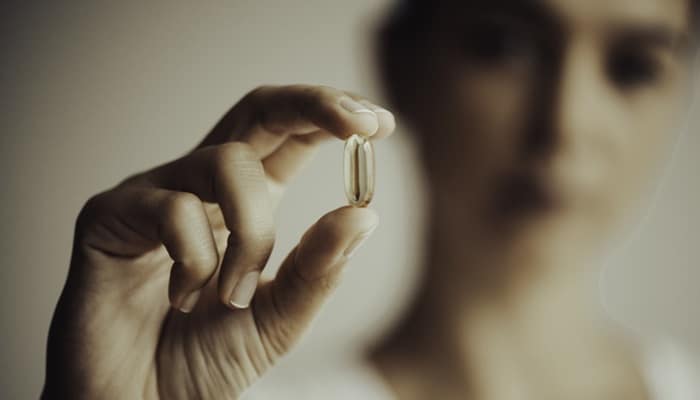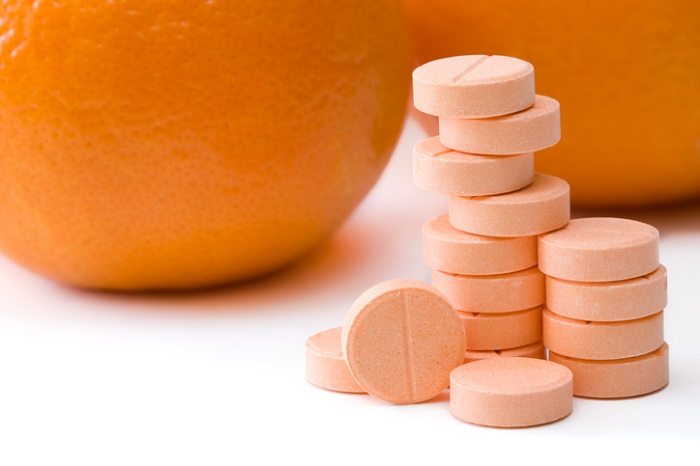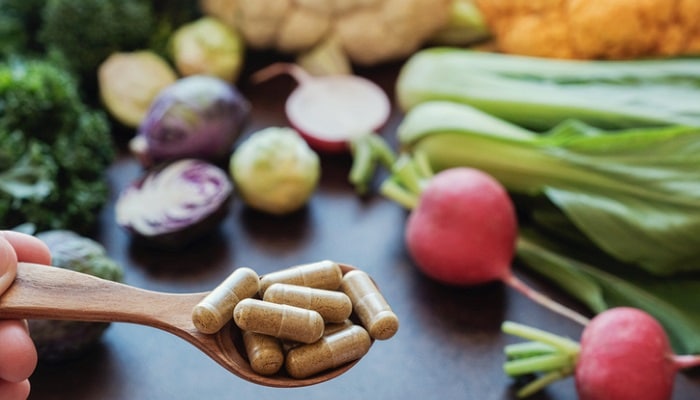Varicose veins can be uncomfortable and difficult to manage. There are many possible causes of varicose veins, and the symptoms are mostly superficial. However, some people may experience painful varicose vein symptoms.
If you have recently been diagnosed with varicose veins, you may be wondering if there is anything you can do. The good news is that certain medical options, lifestyle changes, and even supplements may be able to help.
Keep reading to learn more about varicose veins including their causes, symptoms, remedies, and the science behind varicose vein supplements.
What are varicose veins?
Varicose veins mostly occur on the legs but can appear elsewhere. They are swollen, twisted veins that you can see just under your skin. They do not function like healthy veins.1
You may get varicose veins if the valves in your veins become weak or even damaged, which can lead to blood backflow, pooled blood, and swelling in your veins.
Varicose veins are rather common and tend to occur in women more than men. Other factors that may put you at a higher risk for varicose veins include pregnancy, obesity, age, and a prior deep vein thrombosis (DVT).2
Symptoms of varicose veins
Varicose vein symptoms can vary from one person to another. And some people experience more severe symptoms.
Varicose vein symptoms include:
- Bulging veins
- Swollen legs
- Aches and pains in the legs
- Heaviness in legs and feet
- Itchy veins
- Skin color changes around veins
- Leg cramps at night3
Often, varicose veins can be diagnosed with a simple physical exam, family history, and lifestyle questions. However, sometimes imaging is required for diagnosis.3
You may find that your varicose veins don’t bother you much. Or you may feel pain and discomfort from your varicose veins. Sometimes, pain and discomfort from varicose veins can be alleviated by elevating your legs during rest, avoiding crossing your legs, wearing loose clothing, and avoiding long periods of sitting or standing.1
No matter what caused your varicose veins or how intense your symptoms are, you may find relief from medical or natural options. More specifically, certain supplements for varicose veins may be useful options.
Can supplements help with varicose veins?
Nutrition is thought to play a role in the development and reduction of varicose veins. However, research is somewhat lacking and many studies on the topic show mixed results.
In general, a healthy, well-balanced diet is going to help keep your organs, tissues, and cells working as they should. This means that you may have better circulation and healthier veins if you follow a healthy diet complete with all the macronutrients and micronutrients.

For instance, antioxidant-rich nutrients, like vitamin E and flavonoids, may improve the health of your veins. Flavonoids are also anti-inflammatory, an important factor in the reduction of varicose veins.4
When it comes to taking supplements for varicose veins, it may be more about symptom control than addressing the root cause. This means that certain supplements may be able to help you feel better but won’t rid you of varicose veins forever.
Again, it should be noted that research results on whether supplements can help with varicose veins are mixed. With that in mind, the next section will cover the science behind the top supplements for varicose veins and whether they really work.
Top supplements for varicose veins
Supplements should never replace medical care. Talk with your healthcare provider about the best varicose veins supplements for you.
Below is a look at what limited research says regarding the best supplements for varicose veins.
1. Flavonoids
Flavonoids are found in many fruits and vegetables and have both antioxidant and anti-inflammatory properties. Many supplements also contain flavonoids.
Flavonoids found in supplements like troxerutin, diosmin, and horse chestnut extract may have a beneficial effect on varicose veins. A recent lab study concluded that flavonoids could be a suitable supportive option for varicose veins. The flavonoids used in the study were found to reduce the pathophysiology of varicose veins.5
2. Vitamin E
Vitamin E supplements may help reduce skin pigmentation and discoloration that can occur because of varicose veins.
In one study, people who took vitamin E capsules for four months showed a gradual disappearance of skin pigmentation related to their varicose veins.7
Vitamin E is also known to have both antioxidant and anti-inflammatory properties that may be useful in reducing varicose vein symptoms.8
3. Vitamin C

Vitamin C may be beneficial for people with varicose veins for more than one reason.
Another antioxidant, vitamin C is thought to play a role in the prevention of endothelial dysfunction, or the damage of the cells in your veins. Vitamin C is also needed for the synthesis of collagen, an important protein found in your skin and veins.9
Additionally, vitamin C has been found to improve the barrier and permeability of the cells found in the arteries, which makes them stronger.9
4. Collagen
A lack of collagen, which is needed for elasticity in the veins, has been linked to the formation of varicose veins.10
Collagen is a protein that is needed for strength and elasticity in many parts of your body, including your veins. Studies have found that people with varicose veins tend to have dysregulated collagen synthesis.11
Because of findings like these, it has been suggested that collagen supplements or a collagen-rich diet may help with varicose veins.
5. Niacinamide
A form of vitamin B3, niacinamide may be a useful nutrient for those with varicose veins.
Niacinamide has been linked to reduced inflammation levels in the endothelial cells that line the veins. Vitamin B3 is also thought to support the function of nitric oxide, which is needed for healthy circulation.12
6. Fiber

It may come as a surprise, but fiber may be just the supplement you need to ease your varicose vein symptoms.
Fiber helps relieve constipation, one of the possible causes of varicose veins. Basically, fiber may be able to help not only your digestion but also your blood flow and vein function.
Although little research has been done on the subject, vein centers across the country support the idea of consuming more fiber to help with varicose veins.13
Common options for varicose veins & when to see a doctor
Your healthcare provider can determine how serious your varicose vein problem is and provide recommendations. You may or may not need medication or surgery depending on the severity of your varicose veins.
If prescribed, medications and/or surgery can help with symptom management and prevention of serious complications from varicose veins, such as skin ulcers and deep vein thrombosis.3
You may require just one option or a combination of a few. Typical recommendations for varicose veins include:
- Lifestyle changes, such as increasing physical activity and managing your weight
- Compression therapy to help prevent swelling
- An ablation procedure that will close off varicose veins
- Sclerotherapy to close off varicose veins
- Surgery in which severe varicose veins are completely removed
- Diosmiplex, a medication sometimes used for varicose veins3
You should schedule a visit with your healthcare provider if you have symptoms of varicose veins, like swelling, heavy legs, and skin discoloration. Sometimes, varicose veins can limit your activity, making them a hindrance to your life. Following the guidance of your healthcare practitioner can help you get back on your feet.
 About Brittany Lubeck
About Brittany Lubeck
Brittany Lubeck is a registered dietitian and nutrition writer. She has a Bachelor of Science in Dietetics, a Master of Science in Clinical Nutrition, and began her career as a clinical dietitian. Brittany has always enjoyed research and loves that she can help people learn more about nutrition through her writing.
Sources:
1. “Varicose Veins.” MedlinePlus. Medlineplus.gov.
2. Fukaya, E., A. M. Flores, et al. “Clinical and Genetic Determinants of Varicose Veins.” Circulation 25, no. 138 (2018): 2869-2880.
3. “Varicose Veins.” National Heart, Lung, and Blood Institute. Nhlbi.nih.gov.
4. Lichota, A., L. Gwozdzinski, & K. Gwozdzinski. “Therapeutic potential of natural compounds in inflammation and chronic venous insufficiency.” European Journal of Medicinal Chemistry 15, no. 176 (2019): 68-91.
5. Lichota, A., L. Gwozdzinski, &K. Gwozdzinski. “Therapeutic potential of natural compounds in inflammation and chronic venous insufficiency.” European Journal of Medicinal Chemistry 176 (2019): 68-91.
7. Zhu, Y., J. Xu, et al. “The clinical efficacy observation of fluoroscopy-guided foam sclerotherapy with lauromacrogol for varicose veins of the lower extremities.” Chinese Journal of Radiology 12 (2012): 836-839.
8. “Vitamin E.” National Institutes of Health – Office of Dietary Supplements. Ods.od.nih.gov.
9. May, J. M., F. E. Harrison. “Role of Vitamin C in the Function of the Vascular Endothelium.” Antioxidants and Redox Signaling 17, no. 19 (2013): 2068-2083.
10. Sansilvestri-Morel, P., A. Rupin, et al. “Chronic venous insufficiency: dysregulation of collagen synthesis.” Angiology (2003): 54.
11. Sansilvestri-Morel, P., A. Rupin, et al. “Synthesis of Collagen Is Dysregulated in Cultured Fibroblasts Derived From Skin of Subjects With Varicose Veins as It Is in Venous Smooth Muscle Cells.” Circulation 4, no. 106 (2002): 479-483.
12. Mateuszuk, L., R. Campagna, et al. “Reversal of endothelial dysfunction by nicotinamide mononucleotide via extracellular conversion to nicotinamide riboside.” Biochemical Pharmacology 178 (2020): 114019.
13. “Can a High Fiber Diet Prevent Varicose Veins?” California Vein Specialists. Ezveinsoc.com.